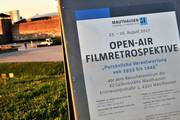Open Air Film Retrospective: 'Individual Responsibility 1933 to 1945' (in German language)
23.08.2017, 20:00 - 26.08.2017, 23:00 Uhr
From 23 to 26 August 2017, films exploring the topic of 'Individual Responsibility 1933 to 1945' were screened at 08:00 pm outside the Visitor Centre at the Mauthausen Memorial.
In times of intense commemoration of the National Socialist period and renewed discussions around individual guilt and collective responsibility, it becomes more necessary than ever to remind ourselves of the events of the years 1933 to 1938. What was the role played by nationalism, racism and the rejection of anything culturally different during these years? Why was it so easy for right-wing extremists and anti-Semites to gain mass appeal? How did people in our society view individual responsibility? And how did people act in 1945 when decisions about life and death were placed in their hands?
Many filmmakers have approached these kinds of questions with great artistic dedication, shaping events and memories into gripping feature films. The experiences of those who survived and those who fled, of those murdered and of the perpetrators are transformed into powerful images in the four films that were shown as part of the 2017 retrospective. They deal with questions of individual decision making, the role of the lone Wehrmacht soldier during the deportation of Jewish communities, for example, with the significance of art and music in the struggle to survive, and with the question of whether civil courage might in fact be a challenge requiring an on-going response.
Introduction by Univ.-Prof. Dr. Frank Stern, Visual Contemporary History and Cultural History, Institute of Contemporary History, University of Vienna, with following discussion-
Free admission.
Programme:
Wednesday, 23 August 2017, 08:00 pm
Professor Mamlock
GDR 1961, director: Konrad Wolf
It is late 1932, early 1933. The chief physician at a clinic in Berlin refuses to believe that the election of the Nazis means anything has fundamentally changed. Only when his daughter is hounded out of school by the insults of her anti-Semitic classmates does his thinking slowly begin to change. His son puts his hopes in the Communist resistance, his friends vacillate. The film is based on a play of the same name by Friedrich Wolf, the father of director Konrad Wolf. The play was staged in several countries in 1933 and 1934 – but no longer in Germany.
Thursday, 24 August 2017, 08:00 pm
Sterne (Stars)
GDR 1959, director: Konrad Wolf
Nazi-occupied Europe in 1943. In occupied Bulgaria, the Wehrmacht is responsible for ensuring the smooth running of the deportation of Greek Jews from Salonika. Bulgaria is an intermediate station on the way to the extermination camps. Through striking images, a thrilling plot and gripping dialogue, Konrad Wolf asks the audience: can an individual, be it a soldier or a resistance fighter, oppose the terror of National Socialism? What do we actually know about the role of the Wehrmacht, or about the assistance given by the Bulgarian population to those persecuted?
Friday, 25 August 2017, 08:00 pm
Spiel um Zeit. Das Mädchenorchester in Auschwitz (Playing for Time. The Women’s Orchestra of Auschwitz)
USA 1980, director: Daniel Mann
In the Auschwitz-Birkenau extermination camp, the Nazis forced deported Jewish female musicians to form an orchestra. The young women were to 'strike up' for the amusement of the concentration camp guards and to calm the Jews being herded into the gas chambers. The film is based on memoirs by members of the Women’s Orchestra who survived, in particular the autobiography of French singer Fania Fénelon.
Saturday, 26 August 2017, 08:00 pm
Drei Tage im April (Three Days in April)
FRG, A 1995, director: Oliver Storz
The end of the 'Third Reich' in April 1945, somewhere in the countryside in the south. The inhabitants of a village, who are hovering between fear of the end of the Nazi regime and fear of the approaching Allied troops, are confronted with a train of deportees that the SS has simply abandoned in the village. It becomes impossible for the villagers to ignore the cries of the people on the train who are dying of hunger and thirst. But how do these men and women act, now that they hold the fate of these others in their hands?
16:00 Uhr
Guided tour of the Mauthausen Memorial
The film series was curated by Univ.-Prof. Dr. Frank Stern, Visual Contemporary History and Cultural History, Institute of Contemporary History, University of Vienna, and by Mag. Stephan Matyus, Mauthausen Memorial.
Links:
Organiser:
Mauthausen Memorial in cooperation with the department Visual Contemporary History and Cultural History of the University of Vienna.
Contact:
KZ-Gedenkstätte Mauthausen / Mauthausen Memorial
Minoritenplatz 9
1010 Vienna
Tel: +43 1 53126-3708
E-Mail: info@mauthausen-memorial.org












